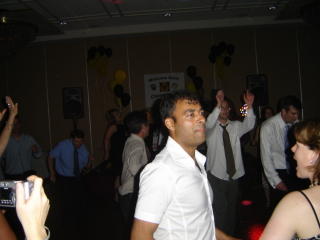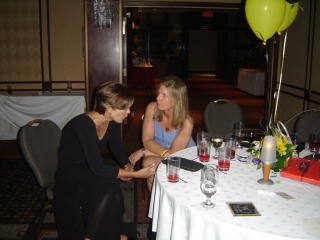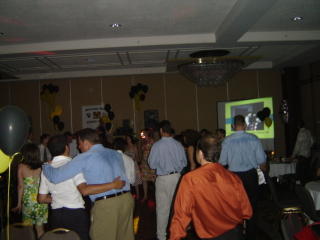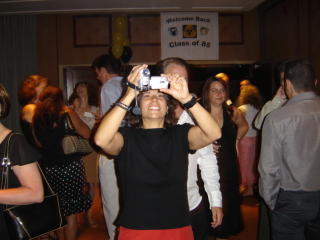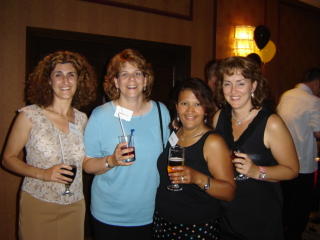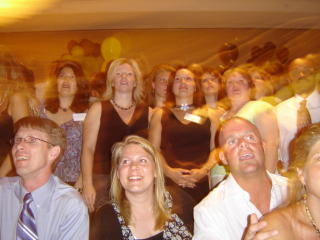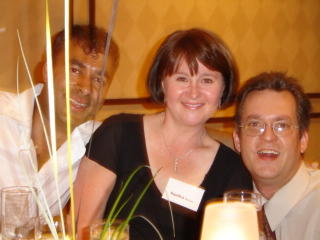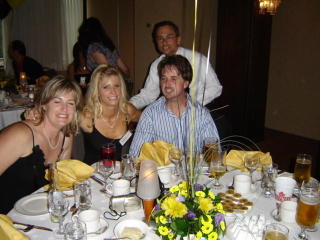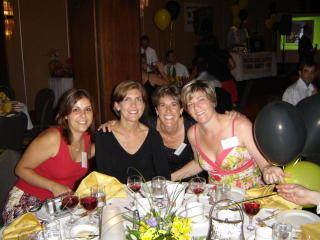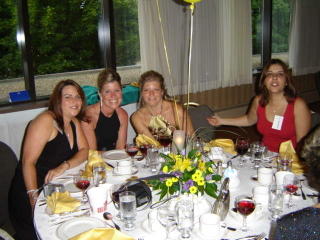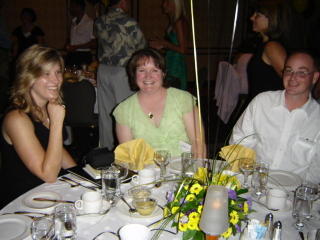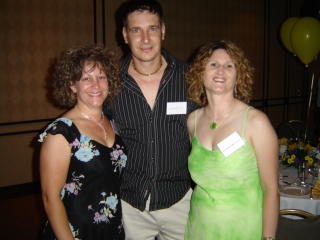I will present you with two scenarios. You are to choose which scenario you would prefer, but both are unpleasant. You have to choose one. You cannot modify the scene or invent a third.
You arrive at home and find the following evidence that the one you love may have engaged in activities you had hoped were reserved: a spent condom, or a dozen roses.
Which scenario do you prefer? The spent condom? A spent condom infers that the one you love may have engaged in activities that you had hoped were reserved. A dozen roses infers that the one you love may have engaged in activities that you had hoped were reserved.
Does one piece of evidence weigh more heavily on your concerns than the other? The spent condom could indicate that your partner is having sex with another because your partner has fallen in love with another, or could indicate a romp and nothing more. A dozen roses could indicate that your partner is willingly accepting the loving gesture of a stranger, and therefore perhaps reciprocating. Or maybe the stranger’s gesture has been unaccepted, but the roses were too pretty to discard.
But you can make only one choice. If you argue that the roses are more acceptable than the condom, you are possibly admitting that you are more concerned about the possibility of love rather than a sexual exploit, or that such an exploit could be accompanied by feelings of love. If you argue that the condom is more acceptable, then you are possibly admitting that you would accept the possibility of your partner engaging in sexual relations with another, as long as they do not fall in love.
How many times have you accepted to brush your teeth with another person’s toothbrush? How many times was that person not someone you trusted completely, and felt devotion towards? Toothbrush-sharing is not something that happens every day, but it is a great test of devotion, commitment and trust. So let’s use this as a third scenario: If your partner said to you that they had accepted to brush their teeth with another person’s toothbrush, would you feel threatened?
Do you think that it is possible to have sex without loving your sexual partner? Do you think that it’s possible to be in love with a person and not have sex? If you answered affirmatively to both, you have established that sex does not necessarily indicate love. Yet we feel threatened if that act, and most specifically that act, is performed by your partner with another.
Do you think that toothbrush-sharing is possible without trust, commitment and devotion? Perhaps toothbrush-sharing should be the act reserved for the wedding night. Maybe more people would be virginal on that night.
All of the former being said, I shudder at the thought of finding a used condom, a bouquet of roses or any evidence of consensual toothbrush-use as evidence of my partner’s actions and decisions. I fear any such breach of the commitment, devotion and trust that I hope we have established as a union.
I brought all of the former considerations to the discussion simply to examine what we have chosen as one of the ultimate physical expressions of that special union that is felt between two beings, and to see whether it could withstand logical examination.
Perhaps it does not survive as intact as we might have anticipated. Perhaps, though, that is all right. We humans seem to engage in, and understand, behaviors that we may not survive reasonable, logical investigation. And I think that’s a part of what makes us human.
This brings me to the topic I wish to explore: Marriage.
Marriage is a word with several definitions. It is differentiated by having a legal, civil definition and a religious one. And it has always been concerned in either the Civil or the Religious sense with the sexuality expressed by mankind.
The easiest to explore is the legal or civil definition. As opposed to other 6 sacraments, the act of marriage and the state of being married implies certain legal rights and civil opportunities not granted to other couples. Here is a list of some of those rights, as presented to me on the following web-page, (a few modifications have been made in order to better present the topic at hand):
http://rainbowallianceopenfaith.homestead.com/gaymarry_Kisa.html1. Shared Taxes
2. Next-of-kin privileges
3. Bereavement leave
4. Wrongful death benefits.
5. Pensions and health insurance
6. Immigration.
7. Social Security.
8. Inheritance
9. Child custody.
10. Family discounts.
11. Car ownership automatically transfers to a spouse, but not to a
surviving partner.
12. Widows/Widowers have standing to challenge their late spouse's
Will.
13. Spouses cannot be compelled to testify in court against one
another.
Here's another partial list of rights and privileges denied to the non-married:
Accidental death benefits for the surviving spouse of a government employee
Appointment as guardian of a minor
Award of child custody in divorce proceedings
Beneficial owner status of corporate securities
Bill of Rights benefits for victims and witnesses
Burial of service member's dependents
Certificates of occupation
Consent to post-mortem examinations
Continuation of rights under existing homestead leases
Control, division, acquisition and disposition of community property
Criminal injuries compensation
Death benefits for surviving spouse for government employee
Disclosure of vital statistics records
Division of property after dissolution of marriage
Eligibility for housing opportunity allowance program of the Housing,
Finance and Development Corporation
Exemption from claims of Department of Human Services for social
services payments, financial assistance or burial payments.
Exemption from conveyance tax
Exemption from regulation of condominium sales to owner occupants
Funeral leave for government employees
Homes of totally disabled veterans exempt from property taxes
Income tax deductions, credits, rates exemption and estimates
Inheritance of land patents
Insurance licenses, coverage, eligibility and benefits organization of
mutual benefits society
Legal status with partner's children
Making, revoking and objecting to anatomical gifts
Making partner medical decisions
Nonresident tuition deferential waiver
Notice of guardian ad litem proceedings
Notice of probate proceedings at a facility for the elderly
Real property
Right to purchase leases and cash freehold agreements concerning the
Management and disposition of public land
Right to sue for tort and death by wrongful act
Right to support after divorce
Right to support from spouse
Rights and proceedings for involuntary hospitalization and treatment
Rights by way of dour or courtesy
Rights to notice, protection, benefits and inheritance under the
Uniform Probate code
Social security benefits on the death of spouse
Sole interest in property
Spousal privilege and confidential marriage communications
Spousal immigration benefits
Status of children
Support payments in divorce action
Tax relief for natural disaster losses
Vacation allowance on termination of public employment by death
Veterans' preference to spouse in public employment
In vitro fertilization coverage
Waiver of fees for certified copies and searches of vital statistics
So I would take it that the act of marriage is something which merits some concern, as far as civil liberties, privileges and responsibilities go.
Although I have not performed an exhaustive cross-societal investigation into the various legal definitions of marriage, I have confidence in offering the following broad legal definition as one which is probably shared across many societies:
MARRIAGE - A contract made in due form of law, by which a free man and a free woman reciprocally engage to live with each other during their joint lives, in the union which ought to exist between husband and wife. By the terms freeman and freewoman in this definition are meant, not only that they are free and not slaves, but also that they are clear of all bars to a lawful marriage.To make a valid marriage, the parties must be willing to contract, able to contract, and have actually contracted.They must be willing to contract. Those persons, therefore, who have no legal capacity in point of intellect, to make a contract, cannot legally marry, as idiots, lunatics, and infants; males under the age of fourteen, and females under the age of twelve; and when minors over those ages marry, they must have the consent of their parents or guardians. There is no will when the person is mistaken in the party whom he intended to marry; as, if Peter intending to marry Maria, through error or mistake of person, in fact marries Eliza; but an error in the fortune, as if a man marries a woman whom he believes to be rich, and he finds her to be poor; or in the quality, as if he marries a woman whom he took to be chaste, and whom he finds of an opposite character, this does not invalidate the marriage, because in these cases the error is only of some quality or accident, and not in the person.When the marriage is obtained by force or fraud, it is clear that there is no consent; it is, therefore, void ab initio, and may be treated as null by every court in which its validity may incidentally be called in question.Generally, all persons who are of sound mind, and have arrived to years of maturity, are able to contract marriage. To this general rule, however, there are many exceptions, among which the following may be enumerated:The previous marriage of the party to another person who is still living. Consanguinity, or affinity between the parties within the prohibited degree. It seems that persons in the descending or ascending line, however remote from each other, cannot lawfully marry; such marriages are against nature; but when we come to consider collaterals, it is not so easy to fix the forbidden degrees, by clear and established principles. In several of the United States, marriages within the limited degrees are made void by statute.Impotency, which must have existed at the time of the marriage, and be incurable.Adultery. By statutory provision in Pennsylvania, when a person is convicted of adultery with another person, or is divorced from her husband, or his wife, he or she cannot afterwards marry the partner of his or her guilt. This provision is copied from the civil law. And the same provision exists in the French code civil.The parties must not only be willing and able, but must have actually contracted in due form of law. The common law requires no particular ceremony to the valid celebration of marriage. The consent of the parties is all that is necessary, and as marriage is said to be a contract jure gentium, that consent is all that is needful by natural or public law. If the contract be made per verba de presenti, or if made per verba de futuro, and followed by consummation, it amounts to a valid marriage, and which the parties cannot dissolve, if otherwise competent; it is not necessary that a clergyman should be present to give validity to the marriage; the consent of the parties may be declared before a magistrate, or simply before witnesses; or subsequently confessed or acknowledged, or the marriage may even be inferred from continual cohabitation, and reputation as husband and wife, except in cases of civil actions for adultery, or public prosecutions for bigamy. But a promise to marry at a future time, cannot, by any process of law, be converted into a marriage, though the breach of such promise will be the foundation of an action for damages.In some of the states, statutory regulations have been made on this subject. In Maine and Massachusetts, the marriage must be made in the presence, and with the assent of a magistrate, or a stated or ordained minister of the gospel. The statute of Connecticut on this subject, requires the marriage to be celebrated by a clergyman or magistrate, and requires the previous publication of the intention of marriage, and the consent of parents; it inflicts a penalty on those who disobey its regulations. The marriage, however, would probably be considered valid, although the regulations of the statutes had not been observed. The rule in Pennsylvania is, that the marriage is valid, although the directions of the statute have not been observed. The same rule probably obtains in New Jersey, New Hampshire, and Kentucky. In Louisiana, a license must be obtained from the parish judge of the parish in which at least one of the parties is domiciliated, and the marriage must be celebrated before a priest or minister of a religious sect, or an authorized justice of the peace; it must be celebrated in the presence of three witnesses of full age, and an act must be made of the celebration, signed by the person who celebrated the marriage, by the parties and the witnesses. The 89th article of the Code declares, that such marriages only are recognized by law, as are contracted and solemnized according to the rules which it prescribes. But the Code does not declare null a marriage not preceded by a license, and not evidenced by an act signed by a certain number of witnesses and the parties, nor does it make such an act exclusive evidence of the marriage. The laws relating to forms and ceremonies are directory to those who are authorized to celebrate marriage.A marriage made in a foreign country, if good there, would, in general, be held good in this country, unless when it would work injustice, or be contra bonos mores, or be repugnant to the settled principles and policy of our laws.Marriage is a contract intended in its origin to endure till the death of one of the contracting parties. It is dissolved by death or divorce.In some cases, as in prosecutions for bigamy, by the common law, an actual marriage must be proved in order to convict the accused. But for many purposes it may be proved by circumstances; for example, cohabitation; acknowledgment by the parties themselves that they were married; their reception as such by their friends and relations; their correspondence, on being casually separated, addressing each other as man and wife declaring, deliberately, that the marriage took place in a foreign country, describing their children, in parish registers of baptism, as their legitimate offspring or when the parties pass for husband and wife by common reputation. After their death, the presumption is generally conclusive.The civil effects of marriage are the following:It confirms all matrimonial agreements between the parties. It vests in the husband all the personal property of the wife, that which is in possession absolutely, and choses in action, upon the condition that he shall reduce them to possession; it also vests in the husband right to manage the real estate of the wife, and enjoy the profits arising from it during their joint lives, and after her death, an estate by the courtesy when a child has been born. It vests in the wife after the husband's death, an estate in dower in the husband's lands, and a right to a certain part of his personal estate, when he dies intestate. In some states, the wife now retains her separate property by statute.It creates the civil affinity which each contracts towards the relations of the other.It gives the husband marital authority over the person of his wife.The wife acquires thereby the name of her husband, as they are considered as but one, of which he is the head. In general, the wife follows the condition of her husband. The wife, on her marriage, loses her domicile and gains that of her husband.One of the effects of marriage is to give paternal power over the issue.The children acquire the domicile of their father.It gives to the children who are the fruits of the marriage, the rights of kindred not only with the father and mother, but all their kin. It makes all the issue legitimate. (source:
http://www.lectlaw.com/def2/m087.htm )
Now we know something that is certain: Lawyers like to speak more than I do. But we also see again that marriage, as far as the law is concerned, is heavily interested in property. Also in rights, privileges and obligations.
As I stated earlier, there is also a religious definition of marriage. As far as Christian religions are concerned, the union of marriage is now considered a sacrament. I feel confident that other religions treat the union in much the same way.
However, the origins of marriage in the religious sense are quite interesting! It is a union more-or-less assumed. The Bible, according to my research, does not go to the extent of the civil definition in establishing the manner of entering into marriage. It does little to establish the rights of each member of the union, but does make some ado over the obligations of each toward the other party.
The earliest reference that I can find relating to the union of Marriage is found in Genesis 1:27 – “God created man in the image of Himself, In the image of God He created him, Male and female He created them,” ‘Man’ is hereby described as a hermaphrodite, sharing in each gender. “God created man”. Only after the description ‘man” is there a differentiation between the sexes.
I feel that this passage establishes the sexes as a creation of God, to give each equal status as creatures of God. But it does little to establish the union of the two. Of course, it is quite logical to deduce that God would want his creatures to unite.
Genesis 2:24 does speak to this issue – “For this reason a man will leave his father and mother and be united to his wife, and they will become one flesh.” I note that in this passage it is not a woman, but rather a wife that the man leaves his mother and father for. This assumes that the marriage, or rather the union, has already taken place, for what is the definition of wife?
Websters defines it as follows: “The lawful consort
of a man;
a woman who
is united to a man
in wedlock;
a woman who has a husband;
a married woman.” I find this a little circular, but we have not yet delved into what it means to be a wife.
Allow me to introduce a few biblical definitions of what it means to be a wife. According to the Easton Biblical Dictionary, the rights of the wife and the origins of her relation to the husband are as follows:
The ordinance of marriage was sanctioned in Paradise (Gen. 2:24; Matt. 19:4-6). Monogamy was the original law under which man lived, but polygamy early commenced (Gen. 4:19), and continued to prevail all down through Jewish history. The Law of Moses regulated but did not prohibit polygamy. A man might have a plurality of wives, but a wife could have only one husband. A wife's legal rights (Ex. 21:10) and her duties (Prov. 31:10-31; 1 Tim. 5:14) are specified. She could be divorced in special cases (Deut. 22:13-21), but could not divorce her husband. Divorce was restricted by our Lord to the single case of adultery (Matt. 19:3-9). The duties of husbands and wives in their relations to each other are distinctly set forth in the New Testament (1 Cor. 7:2-5; Eph. 5:22-33; Col. 3:18, 19; 1 Pet. 3:1-7).
This speaks to what I feel is an important part of the understanding of what is meant by the union. I sense that there is an understanding that both shall not be equal, at least as far as the normal understanding of power is concerned. But this is strictly guided by the principles offered in the guidance: devotion, commitment and trust. God is the Father, yet he placed his trust, his devotion and his commitment to Christ. Christ is the servant of God, yet he reveals Himself in obeying his duty to be devoted to God, to trust in God, and to maintain his commitment in God. Who is more subservient than whom?
Even accepting the wording that “Christ is the servant of God” allows for the servant’s needs to master the actions of the master himself. An analogy might make my thoughts more clear: Who has trapped whom: the bolt or the nut?
Thus, even amid the semantics that can be thrown at the concept of husband as keeper and wife as servant, we can see how the concept of union can take place.
If a “wife” was to be an “offering”, and “husband” to be a “caregiver”, does the sexual gender retain its meaning? Does the soul have a sexual gender? This is not meant to obscure the obvious goal of preserving the species’ ability to procreate and to care adequately for the outcome of such procreation. This is meant as an exploration of what the religious definition of marriage should rightly preserve.
Corinthians seems to present a rather ambivalent attitude towards marriage. “
7:25Now concerning virgins, I have no commandment from the Lord, but I give my judgment as one who has obtained mercy from the Lord to be trustworthy.
7:26I think that it is good therefore, because of the distress that is on us, that it is good for a man to be as he is.
7:27Are you bound to a wife? Don't seek to be freed. Are you free from a wife? Don't seek a wife.
7:28But if you marry, you have not sinned. If a virgin marries, she has not sinned. Yet such will have oppression in the flesh, and I want to spare you.”
It even gets more bold as the passage continues on: “But I say this, brothers: the time is short, that from now on, both those who have wives may be as though they had none;
7:30and those who weep, as though they didn't weep; and those who rejoice, as though they didn't rejoice; and those who buy, as though they didn't possess;
7:31and those who use the world, as not using it to the fullest. For the mode of this world passes away.
7:32But I desire to have you to be free from cares. He who is unmarried is concerned for the things of the Lord, how he may please the Lord;
7:33but he who is married is concerned about the things of the world, how he may please his wife.”
It is quite reciprocal, however: “There is also a difference between a wife and a virgin. The unmarried woman cares about the things of the Lord, that she may be holy both in body and in spirit. But she who is married cares about the things of the world--how she may please her husband.
7:35This I say for your own profit; not that I may ensnare you, but for that which is appropriate, and that you may attend to the Lord without distraction.
7:36But if any man thinks that he is behaving inappropriately toward his virgin, if she is past the flower of her age, and if need so requires, let him do what he desires. He doesn't sin. Let them marry.
7:37But he who stands steadfast in his heart, having no necessity, but has power over his own heart, to keep his own virgin, does well.
7:38So then both he who gives his own virgin in marriage does well, and he who doesn't give her in marriage does better.
7:39A wife is bound by law for as long as her husband lives; but if the husband is dead, she is free to be married to whoever she desires, only in the Lord.
7:40But she is happier if she stays as she is, in my judgment, and I think that I also have God's Spirit.”
I thank the online version of the King James Bible for the preceding passages:
http://www.earlychristianwritings.com/text/1corinthians-web.html Jesus himself seems to have not shared in this ambivalence towards marriage. As we witnessed in Genesis 2:24, so it is repeated in Matthew 19:4-6 – “4 And he answered and said unto them, Have ye not read, that he which made them at the beginning made them male and female,5 And said, For this cause shall a man leave father and mother, and shall cleave to his wife: and they twain shall be one flesh?6 Wherefore they are no more twain, but one flesh. What therefore God hath joined together, let not man put asunder.
Here we have the concept of cleaving, and the insistence upon the permanence of the union. I believe that these two concepts for an essential part of the religious (Christian?) concept of Marriage. Surely, there is an insistence that the two beings united be separate, but the entering into matrimony makes them one. This is the essential desire of the union itself. Is it the union that is paramount, or the constitutive components of said union?
So we move between the Pauline tradition of marriage of the Corinthians with its ambivalence; towards the Patristic period of the concept of marriage. I quote here the Ste-Catherine of Sienna Catholic Community Origin of the Sacrament of Marriage, found at
http://www.stcatherine.org/marriage.html . I find the following passage especially interesting:
“The Patristic period reveals remarkable diversity in Catholic understandings of marriage. One thing is clear--during this era there was no mandated religious ceremony required for valid marriages. Juridical concerns with regard to marriage were handled exclusively by the state. While consent and blessing of the bishop or presbyter was encouraged (e.g. Ignatius, Letter to Polycarp) there is no evidence that this was a common practice.
Attention was being paid to the theological aspect of the marriage relationship. Many of the Fathers defended marriage against the attacks of the Gnostics and later the Manichaeans. The apologetics, however, focused on procreation as the essential function of sexual relations and marriage. Augustine's justification of marriage in terms of procreation is well-known. Although this was his main emphasis, he also recognized that marriage expressed the social nature of humans. As such, marriage could be seen as a type of spiritual communion. Unfortunately, neither Augustine nor any of the other Fathers saw the connection between these two understandings.
One significant development which occurred in the Middle Ages, was the rise of ecclesiastical marriage ceremonies and legislation. Prior to this period, it was left to civil authorities to legislate marriages. The Church concerned itself with only the moral dimension of the marriage relationship. This changed, in part, because of a clash in traditions regarding matrimony. In the Roman culture, a marriage was legal and binding on the basis of consent between the spouses and their guardians. In the Frankish and Germanic traditions, a marriage was not considered binding until consummated by sexual intercourse. As these traditions blended, the problem of secret marriages arose. An individual who did not wish to enter into an arranged marriage would claim that consent had secretly been given to another. In the Roman tradition, this prior consent was considered binding. The Church therefore slowly began to recommend public consent given in the presence of a priest and witnesses. By the twelfth century, ecclesiastical wedding ceremonies incorporating this public witness, had become common in Europe. The Council of Trent made such ceremonies mandatory.
Throughout the Church's history, theologians have been somewhat skittish about the religious significance of the marriage institution. The attacks of the Albigensians and Waldensians on the goodness of sexuality, much like the Gnostics and Manichaeans of an earlier time, led the Church to speak explicitly of the sacramentality of marriage. It was included as a sacrament in Pope Innocent III's Profession of Faith in 1208 and was listed definitively by the Council of Trent in 1563.
In spite of the affirmation of marriage's sacramentality at Trent, the Church theologically continued to view marriage as a contractual agreement. The impression was given that the sacramental character lay in the contract itself. The husband and wife each had certain rights and responsibilities. The primary function continued to be the procreation of children. Nonetheless, Pope Pius Xl's encyclical CASTI CONNUBII (1930) speaks of the "mutual faithfulness of husband and wife" as the "second blessing" of marriage.
According to this source, the act of entering into the union was firstly an affair of the two entering into such a union. This was confessed to the state, who occupied itself with civil affairs of property and obligations. And then the Church would merely recognize, perhaps bless the event that had nonetheless already occurred. I find it especially interesting to note that the union was not even considered a sacrament until twelve centuries after the creation of Christ’s Church.
Christ himself administered certain sacraments, but nowhere have I seen evidence of Christ administering the sacrament of marriage. Was this done by error or by choice?
In all that I have seen the Church maintains an instructive role on how it sees the union which is essential to society and to humanity. As such it has a maintained position to involve itself not in the profane aspects, but in the sacred. It is not involved in nor interested in the aspects which I had gleaned from a legal inspection of the union, with its preoccupation with property, rights, privileges and obligations, any more than an aside. It preoccupies itself rather on the timeless elements of the union itself.
Perhaps there is another way of seeing that Religion merely offers opinion on what is essentially an issue between the two partners, recognized separately as a civil and legal issue and perhaps lastly as an issue that Religion is concerned with: We call our siblings and parents obtained as a result of said union our Fathers, Mothers, Brothers and Sister our “In-Laws”.
Whereas I believe that religion may instruct us on how to address the civil issues of who can or should marry, and what rights and obligations each shall owe the other in the union, and how or when it is legitimate to terminate the union itself, I cannot see it as offering any more than its opinion on such matters. Religion should do no more than that since the union takes place between the two. In admitting that it is really the two individuals who decide to form the union, we must accept that the union has in fact occurred. Who decides that they want to spend the rest of their lives with another only after they have consulted either their priest or judge?
Accepting this opinion, we come to another conclusion: The wedding ceremony is a celebration of the commitment that two human beings have made towards each other. That celebration may involve inviting the Church or the Court. If the Church or the Court refuse to accept the invitation, that is their prerogative. The celebration will occur regardless. Does this mean that the Court or the Church can refuse to accept the union? Or does it merely illustrate either’s right to participate in the celebration. Humans have a natural right to association.
Religious decisions are taken only after long periods of study and inspection, because the goal of religious decisions are to reach beyond the immediate, the temporal. Religion can be more concerned with the preservation of those aspects which are not temporal, not subject to the conditions of earth: trust, commitment and devotion. These are possible and desirable between two humans… Any two humans.
The Church and others have made arguments against this definition. If any two humans, (goes the argument,) can marry where is the ban on incest? A mother and her son, or a father and his son, may be in love and desiring of a formal partnership.
Firstly, this argument suffers of the logical flaw of the slippery-slope. Accepting that any two humans may desire to marry does not lead to the conclusion that all humans will desire to marry.
At this point it is necessary to examine the desire to marry in the first place, and the consequences of that choice. Marriage is the desire to enter into a union of committed devotion and love. Child-bearing is a desire to bring new humans into the world. And of course the civil authorities and the Church are interested in this distinction.
However, I have separated the two desires. They are distinct. The creation of new human beings is a subject not to be taken lightly, however it is not a necessary consequence of the union and therefore cannot be a condition of the union. No one knows in advance whether or not they are capable of procreation. In the same way that we cannot, or should not, condemn the union of impotent heterosexual unions we cannot and should not condemn the union of impotent homosexual unions. You may argue at this point that the homosexual union is a de-facto impotent union, to which I will counter that even an impotent union is capable of adoption.
Since the creation of a new human is the creation of a distinct person, who at the time of birth is not capable of defending his/her own rights, it becomes the responsibility of Society to ensure those rights.
If we separate each act, of the union and of procreation, we may be able to get to the case-at-hand. The act of Marriage occurs between two consenting adults, entering into a mutual commitment. The act of procreation involves the rights of a third-party: The person born.
It is merely efficient to assume that the control of one act will maintain the outcome of the other. Even heterosexual relations laws are not sufficient to ensure the rights of those borne unto those unions.
Society has a responsibility to constantly evaluate the conditions of its members. That being said humans who enter into a sexual union are by-and-large capable of understanding the consequences of their sexual activities. Heterosexuals face the same challenges as homosexuals when faced with that responsibility. If there were any evidence that your offspring would be born with defects, you must decide: Do you attempt to conceive or not?
Homosexuals are no less capable of assuming that challenge. Homosexuals are not deficient in their capability of facing that choice.
And after that choice is made, as humans you must face the reality of that choice. You must care for the offspring. This is not a condition that can be eliminated by a discussion of the meaning and appropriateness of marriage.
A mustachioed person in history once thought that the successful outcome of the human race was dependant on the control by his party of who could marry and how to measure and control the outcome. I think we can all see the evil in his actions.








